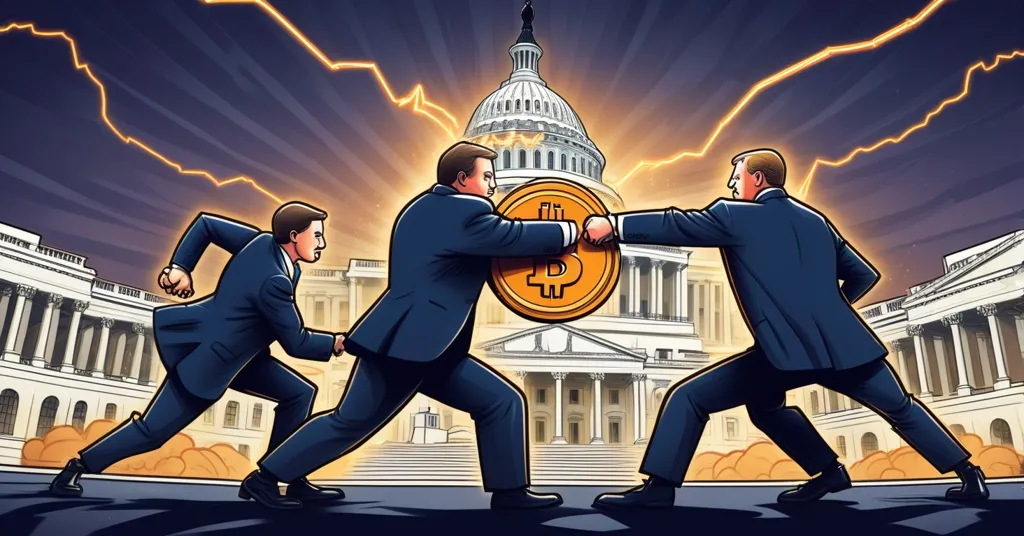Crypto Trade Groups Push for CLARITY Act 2025: A Game-Changer for Bitcoin Regulation?

Crypto Trade Groups Rally for CLARITY Act 2025: A Turning Point for Bitcoin and Blockchain?
Three powerhouse crypto advocacy organizations—Blockchain Association, The Digital Chamber, and Crypto Council for Innovation—have fired a shot across the bow of U.S. regulatory gridlock, urging Congress to pass the CLARITY Act. This bipartisan legislation could redefine the future of digital assets by shifting oversight from the Securities and Exchange Commission (SEC) to the Commodity Futures Trading Commission (CFTC), potentially unshackling innovation in the Bitcoin and blockchain space.
- Urgent Push: On July 11, 2025, a joint letter was sent to House leaders Mike Johnson and Hakeem Jeffries demanding passage of the CLARITY Act.
- Regulatory Overhaul: The Act aims to transfer crypto oversight from the SEC to the CFTC, offering clearer rules for digital assets.
- Political Clash: Republicans champion a “Crypto Week” for pro-crypto laws, while Democrats counter with an “Anti-Crypto Corruption Week” highlighting industry risks.
For Bitcoin enthusiasts and blockchain innovators, this is more than just a policy debate—it’s a fight for the soul of decentralized finance. The SEC’s draconian “regulation-by-enforcement” approach has long treated cryptocurrencies like Bitcoin and countless altcoins as securities, drowning projects in legal quicksand. The CLARITY Act could be the lifeline the industry needs, reclassifying most digital assets as commodities under the CFTC’s lighter touch, as highlighted by key crypto trade groups pushing for its passage. But with Washington, D.C., turning into a battleground of partisan agendas, the path to clarity is anything but clear. Let’s break down the stakes, the players, and the potential fallout.
What Is the CLARITY Act, and Why Does It Matter?
At its core, the CLARITY Act—detailed in House Report H.R. 168 of the 119th Congress—seeks to amend the Commodity Exchange Act (a law governing futures and options markets since the 1930s) to bring digital assets under the CFTC’s jurisdiction. Unlike the SEC, which often views tokens as investment contracts subject to stringent rules, the CFTC has historically classified Bitcoin as a commodity since 2015, focusing on market integrity over micro-managing innovation. The Act would formalize this framework for most cryptocurrencies, providing exemptions for decentralized finance (DeFi) activities—like running blockchain nodes or building user interfaces—unless fraud or manipulation is involved.
For the uninitiated, DeFi is like a bank without bankers: financial systems built on blockchain tech where smart contracts (self-executing code) automate everything from loans to trades, cutting out traditional middlemen. These exemptions could be a game-changer for developers who’ve been paralyzed by the threat of SEC lawsuits. The legislation also arms the CFTC with new resources, including fee structures and hiring powers, to handle its expanded role, though it includes temporary measures to adapt over time. The CEOs of the advocating groups—Summer Mersinger of Blockchain Association, Cody Carbone of The Digital Chamber, and Ji Hun Kim of Crypto Council for Innovation—put it bluntly in their letter to House Speaker Mike Johnson and Minority Leader Hakeem Jeffries:
“The CLARITY Act represents meaningful progress toward the regulatory certainty needed for our industry to foster innovation and for blockchain technology to thrive in the U.S.”
They also framed it as a geopolitical win, stating:
“Advancing this bipartisan market structure legislation sends a strong message that the U.S. is committed as the global leader in digital assets.”
For Bitcoin hodlers, this could mean safer mainstream adoption as clearer rules reduce legal risks for exchanges and custodians. For DeFi innovators, it’s a potential green light to build without looking over their shoulder, with some discussions on platforms like Reddit exploring its impact on Bitcoin regulation. But the devil’s always in the details, and this bill is far from a done deal.
The Industry’s Cry for Freedom: Why the SEC Is Public Enemy No. 1
The crypto world has been at war with the SEC for years, and for good reason. Their “regulation-by-enforcement” strategy is less a framework and more a game of whack-a-mole—tokens get labeled as securities on a whim, projects face lawsuits without warning, and innovation takes the hit. Mersinger, a former CFTC Commissioner, has called this a “punitive” approach that risks squandering a generational opportunity for the U.S. to lead in blockchain tech. She’s pointed to recent court victories, like challenges to the SEC’s overreaching dealer rule, as proof that the tide can turn if the industry speaks with one voice. For a deeper look at the regulatory tug-of-war, check this comparison of CFTC vs. SEC oversight for crypto.
This isn’t just whining from crypto bros. The lack of clear guidelines has real consequences. U.S.-based startups are fleeing to jurisdictions like the European Union, where the Markets in Crypto-Assets (MiCA) framework offers a defined sandbox to play in, or to Asia’s crypto-friendly hubs. A 2023 report from Electric Capital noted that nearly 30% of U.S. blockchain developers relocated overseas between 2020 and 2022, citing regulatory uncertainty as the top reason. Bitcoin, as the original decentralized currency, stands to gain the most from commodity status—finally treated as digital gold rather than a shady stock. Altcoins and Ethereum-based DeFi projects might ride the coattails, filling niches Bitcoin doesn’t touch, like programmable finance or tokenized assets. But without a unified push for bills like the CLARITY Act, the brain drain will only accelerate.
Political Firestorm in D.C.: Crypto as a Partisan Piñata
Washington’s treatment of crypto right now is like watching a cage match with no referee. Republicans are gearing up for a “Crypto Week” on Capitol Hill, aiming to fast-track digital asset-friendly legislation like the CLARITY Act. They see blockchain as an economic engine, a way to outpace global rivals in the race for financial innovation. On the flip side, Democrats, led by Congresswoman Maxine Waters (ranking member of the House Financial Services Committee) and Congressman Stephen Lynch, are staging an “Anti-Crypto Corruption Week” to slam the brakes. Their concerns are detailed in recent statements on crypto industry vulnerabilities. Their beef? They argue the industry is riddled with vulnerabilities—scams, fraud, and systemic risks—that bills like this ignore.
Waters, who’s overseen 22 hearings on financial tech since 2019, isn’t buying the hype. She’s accused Republican-backed crypto laws of lacking consumer protections and even tied them to personal enrichment by former President Donald Trump, alleging a $1.2 billion windfall from crypto ventures as reported by Forbes. She’s gone as far as calling these bills a congressional endorsement of “Trump’s unprecedented crypto scam.” Lynch is just as brutal, stating:
“My Republican colleagues are eager to continue doing the bidding for the crypto industry while conveniently ignoring the vulnerabilities and opportunities for abuse that exist in crypto.”
He’s framed the CLARITY Act as a threat to financial stability, national security, and everyday investors, warning it could undermine traditional markets by giving crypto a free pass on safeguards. Democrats point to past disasters—think FTX’s collapse in 2022, where billions in customer funds vanished, or notorious rug pulls (scams where developers abandon projects after hyping them) that fleeced millions—as proof that oversight can’t be lax. They’ve even proposed amendments and procedural blocks to halt the bill, showing this isn’t just rhetoric; it’s a full-on legislative war.
Playing Devil’s Advocate: Is CFTC Oversight the Silver Bullet?
Let’s pump the brakes on the hype train for a second. While the CFTC might be less suffocating than the SEC, it’s not like they’re rolling out a red carpet for crypto. Their focus on commodities means they’re used to dealing with things like corn futures, not 24/7 global markets or cross-border DeFi protocols. Could they fumble the ball on crypto’s unique challenges? Possibly. And while clarity sounds great, without sharp teeth to punish bad actors, this could become a loophole for scammers to hide behind “commodity” status. The industry itself isn’t spotless—every rug pull and pump-and-dump scheme (where prices are artificially inflated before crashing) gives ammo to skeptics like Waters and Lynch. Some perspectives on how the CLARITY Act might affect blockchain innovation raise similar doubts.
Then there’s the risk of swapping one bureaucratic cage for another. Bitcoin maximalists, who see BTC as the ultimate sound money free from centralized control, might wince at any regulator calling the shots, even a “friendlier” one. Mersinger herself admits consumer protections aren’t optional, suggesting clarity and safeguards can coexist. But if the CLARITY Act becomes a watered-down compromise to appease both sides, it might satisfy no one. And let’s not forget the altcoin crowd—while Bitcoin could solidify its commodity cred, Ethereum and other protocols tied to complex DeFi might still face gray areas under CFTC rules. Balance is key, but perfection is a pipe dream.
Global Stakes: Can the U.S. Keep Its Blockchain Crown?
Zoom out, and the picture gets even uglier. The U.S. isn’t playing this game in a vacuum. The EU’s MiCA framework, rolled out in 2023, already gives crypto firms a clear playbook, attracting talent and capital. Asia’s hubs like Singapore and Hong Kong are buzzing with blockchain patents—China alone filed over 50% of global crypto patents in 2022 per WIPO data. If the U.S. keeps bickering, it risks ceding leadership in digital assets. Mersinger warned in a recent commentary that failing to act now could push innovation overseas permanently, a sentiment echoed by industry reports showing U.S. market share in crypto trading volume dropping from 48% in 2019 to 33% by 2023 (per Chainalysis). For more on the legislative context, see this detailed overview of U.S. cryptocurrency regulation and the CLARITY Act.
Passing the CLARITY Act could flip the script, signaling to the world that America is open for blockchain business. It might even set a regulatory precedent others follow, much like U.S. financial rules have shaped global markets in the past. But if partisan mudslinging—complete with personal jabs and billion-dollar accusations—turns this into a circus, the U.S. could be left eating dust while competitors sprint ahead. For Bitcoin purists, this is about more than market share; it’s about ensuring decentralized money isn’t choked by red tape while altcoins carve out their own disruptive paths. Industry voices, as noted in analyses of SEC vs. CFTC approaches to crypto, stress the urgency of seizing this moment.
Key Takeaways and Burning Questions on Crypto’s Regulatory Future
- What does the CLARITY Act aim to do for Bitcoin and crypto?
It seeks to shift oversight from the SEC to the CFTC, treating most digital assets as commodities, not securities, with DeFi exemptions to fuel innovation and provide legal certainty. - Why is the SEC such a roadblock for the industry?
Their enforcement-first approach labels tokens as securities without clear rules, creating a hostile environment that stifles projects and drives talent abroad. - How does the political divide in Congress affect crypto’s future?
Republicans’ “Crypto Week” pushes for innovation-friendly laws, while Democrats’ “Anti-Crypto Corruption Week” focuses on scams and risks, risking a deadlock on bills like the CLARITY Act. - What happens if the U.S. fails to pass regulatory clarity?
Innovation could migrate to regions like the EU or Asia with established frameworks, eroding U.S. dominance in blockchain and digital asset markets. - Are corruption concerns from Democrats valid or overblown?
There’s legitimacy in citing scams like FTX…..[and so on for the rest of the list] - Could CFTC oversight still fall short for Bitcoin and altcoins?
Yes, their commodity focus might not fully grasp crypto’s nuances, and without strong anti-scam measures, bad actors could exploit regulatory gaps.
The CLARITY Act isn’t just another bill gathering dust in Congress; it’s a litmus test for whether the U.S. can balance innovation with accountability in the crypto age. On one hand, passing it could unleash a tidal wave of blockchain development, cementing America’s role at the forefront of this financial revolution—especially for Bitcoin as the bedrock of sound, decentralized money. On the other, the fears of consumer harm and systemic risk aren’t baseless; crypto’s rap sheet of scams and crashes demands serious guardrails. The industry must step up with self-policing to root out fraudsters, not just beg for lighter rules. Meanwhile, Congress needs to cut through the partisan noise and focus on policy over personal vendettas. With global rivals watching and waiting to pounce, will clarity or chaos define crypto’s next chapter? That’s the billion-Bitcoin question. For a broader perspective on the legislative background, explore this wiki on cryptocurrency regulation under the CLARITY Act.



